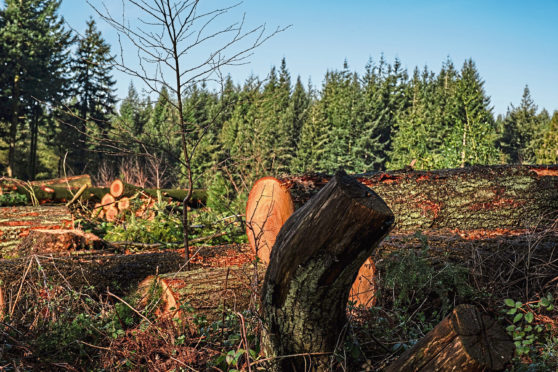Commercial forestry investors are continuing to target Scottish land for tree planting, with nearly 11,000ha planted in the year to March 2020 – 67% of it in conifers.
Investment is expected to accelerate, given substantial financial incentives and the news that the forestry sector has just celebrated a highly successful year, with values per stocked hectare increasing by 39%, from £11,749 in 2019 to £15,962 in 2020.
Writing in the latest UK Forest Market Report, produced by Tilhill and John Clegg & Co, Tilhill’s head of investment and property, Bruce Richardson, said Scotland accounted for 82% of the total newly planted area in the UK.
He added: “Interestingly, the average size of scheme was relatively small at around 25ha, possibly indicating that the majority of schemes are landowners tidying up small parcels of less productive land.
“Can we anticipate that the supply of this type of land will start to dry up at some stage, and that investor-led schemes will take a larger role?
“The pipeline of schemes coming through the approval process remains very strong this year.”
While Scottish farmers’ representatives have often treated forestry with suspicion – especially in the tenanted sector – there are signs that opposition is easing as agriculture comes under pressure to play a role in meeting climate change targets.
The chairman of the Scottish Tenant Farmers’ Association (STFA), Christopher Nicholson, believes that while there is a danger that ever-growing demand for forestry planting land poses a real threat to those who do not have secure tenancies, the industry needs to open up forestry opportunities for farmers who enjoy traditional secure leases.
He said: “The drive through subsidies and fiscal measures to plant land makes it really attractive to investors.
“Some tenants are coming under pressure to give up their holding and while those with secure tenancies are in a strong position to do a deal with their landlords, in the case of less secure leases on upland hill farms we’re seeing farmers who are not yet ready to retire having to give up their land and that’s a big concern.
“Marginal land is also where new blood traditionally got a start in the farming industry.”
Mr Nicholson insisted the STFA wanted secure tenants to be able to take advantage of forestry opportunities themselves.
“They don’t necessarily have to be for full-scale commercial forests, but amenity planting and shelter belts,” he said.
“We are working with government and others to find ways of overcoming some of the hurdles.”
